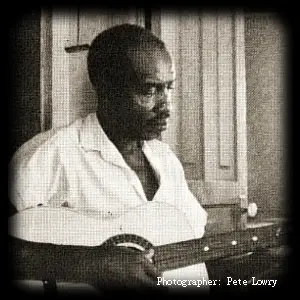 Floyd Council was a superb Piedmont guitarist, mandolin player and singer, whose records appeared under the names ‘Dipper Boy’ Council and ‘The Devil’s Daddy-in-Law’. These tags were the work of his manager J D Long, who loved to give his acts memorable names: he called Fulton Allen ‘Blind Boy Fuller‘, harp player Saunders Terrell became ‘Sonny Terry‘ and washboard maestro George Washington was billed as ‘Bull City Red’, so it is beyond ironic that Floyd Council would give his birth-name to one of the most famous rock bands in the world! The teenage Syd Barrett formed a band in his home-town of Cambridge, England in 1965, and reading Paul Oliver‘s sleeve notes to a Blind Boy Fuller album, noticed the names of Pink Anderson and Floyd Council in the credits, and at that moment decided to call the band ‘Pink Floyd’.
Floyd Council was a superb Piedmont guitarist, mandolin player and singer, whose records appeared under the names ‘Dipper Boy’ Council and ‘The Devil’s Daddy-in-Law’. These tags were the work of his manager J D Long, who loved to give his acts memorable names: he called Fulton Allen ‘Blind Boy Fuller‘, harp player Saunders Terrell became ‘Sonny Terry‘ and washboard maestro George Washington was billed as ‘Bull City Red’, so it is beyond ironic that Floyd Council would give his birth-name to one of the most famous rock bands in the world! The teenage Syd Barrett formed a band in his home-town of Cambridge, England in 1965, and reading Paul Oliver‘s sleeve notes to a Blind Boy Fuller album, noticed the names of Pink Anderson and Floyd Council in the credits, and at that moment decided to call the band ‘Pink Floyd’.
Floyd Council was born in 1911 at Chapel Hill, in Orange County NC, and as a teenager was playing guitar for tips on the streets of his home-town. He was often in the company of the Strowd brothers, and they played parties and local dances as ‘The Chapel Hillbillies’. Floyd later played his fine Piedmont style finger-picking guitar on the streets of nearby Durham, where he met and befriended Fulton Allen. There was good money to be made playing for the thousands of tobacco workers there, especially on payday, so Floyd and Fulton cashed in by playing together. When local record store owner J D Long became Fulton’s manager in 1935, he took him to a New York recording studio, and several good-selling records were released by ‘Blind Boy Fuller’. Floyd was invited to go with them to New York in February 1937, where his guitar playing on three of Fuller’s records is credited to ‘Dipper Boy’ Council. He also cut several solo tracks under that name, resulting in ‘I’m Grievin’ and I’m Worryin’ being released on the Melotone label, but on ‘Runaway Man’ on ARC, Floyd was billed as ‘Dipper Boy, Blind Boy Fuller’s Buddy’.
Superb Piedmont Blues on ‘Lookin’ for My Baby’;
Floyd Council Discography
There is no album dedicated to Floyd’s work, but six of his songs are included on this compilation alongside the work of Richard and Welly Trice and Eddie King’s Washboard Band.
Carolina Blues, 1937-1947
Later that year, the same crew returned to New York for more sessions, with Floyd playing on four of Fuller’s tracks and cutting four more of his own songs, including two with Sonny Terry, which were released on the Vocalion and Conqueror labels credited to ‘The Devil’s Daddy-in-Law’. One of these, ‘I Don’t Want No Hungry Woman’ was adapted by Fuller as ‘Why Don’t My Baby Write to Me?’ There were to be no more records released by Floyd, but in the wake of the ‘Blues-revival’, he recorded for Blues researcher Pete Lowry in 1970. Unfortunately Floyd had suffered a stroke by then, leaving his voice and movement badly affected. He passed away from a heart attack in 1976. There is a Floyd Council Memorial Project currently working to provide a suitable headstone for Floyds grave in White Oak Cemetery, Sanford NC.
 Floyd Council was a superb Piedmont guitarist, mandolin player and singer, whose records appeared under the names ‘Dipper Boy’ Council and ‘The Devil’s Daddy-in-Law’. These tags were the work of his manager J D Long, who loved to give his acts memorable names: he called Fulton Allen ‘Blind Boy Fuller‘, harp player Saunders Terrell became ‘Sonny Terry‘ and washboard maestro George Washington was billed as ‘Bull City Red’, so it is beyond ironic that Floyd Council would give his birth-name to one of the most famous rock bands in the world! The teenage Syd Barrett formed a band in his home-town of Cambridge, England in 1965, and reading Paul Oliver‘s sleeve notes to a Blind Boy Fuller album, noticed the names of Pink Anderson and Floyd Council in the credits, and at that moment decided to call the band ‘Pink Floyd’.
Floyd Council was a superb Piedmont guitarist, mandolin player and singer, whose records appeared under the names ‘Dipper Boy’ Council and ‘The Devil’s Daddy-in-Law’. These tags were the work of his manager J D Long, who loved to give his acts memorable names: he called Fulton Allen ‘Blind Boy Fuller‘, harp player Saunders Terrell became ‘Sonny Terry‘ and washboard maestro George Washington was billed as ‘Bull City Red’, so it is beyond ironic that Floyd Council would give his birth-name to one of the most famous rock bands in the world! The teenage Syd Barrett formed a band in his home-town of Cambridge, England in 1965, and reading Paul Oliver‘s sleeve notes to a Blind Boy Fuller album, noticed the names of Pink Anderson and Floyd Council in the credits, and at that moment decided to call the band ‘Pink Floyd’.